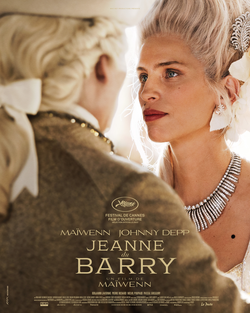
VERSAILLES
Posted July 8th, 2024 at 8:03 pmNo Comments Yet
COURTESAN LOVE AND AFFECTION FOR KING LOUIS XV OF FRANCE
By PETER THOMAS BUSCH
Maiwenn and Johnny Depp explore the little beauty of Versailles through the intimacy of the relationship between the King and his mistress.
Set in 18th Century France, Maiwenn directs and stars in the biographical drama, Jeanne du Barry (2024).
The story follows Jeanne from a young child as she rises in status as an illegitimate child in a broken home to becoming a member of the King’s Court.
One of Jeanne’s valuable gifts that make her more appealing is the ability to read and write after being educated as a child by her mother’s wealthy partner.
As a courtesan, Jeanne survives as a commoner by attaching herself to rich men. Eventually, Jeanne’s obvious appeal catches the eye of French King Louis XV. And then the story begins.
Director Maiwenn takes the camera inside and outside of the palace to capture the architectural splendour before examining the little details that bring the King and Jeanne closer and closer together.
Several scenes become pretty portraits of people and stunning landscapes. And at one point, during the transition of Jeanne to Paris, time and space are compressed by shifting the camera from character close ups to landscape long shots.
Depp shows King Louis XV to be an amendable ruler of Versailles, often himself bemused at having to work through the little daily rituals built around him for the benefit of everyone else in the court.
Louis XV’s daughters are just the center pieces to dozens of people spending their days around the King’s routines.
Minimal dialogue is used to tell the story with a very linear narrative compelled forward by the unfolding of relationships.
The sheer presence of Jeanne as a commoner is immediately the subject of scandal. But when Jeanne is allowed to stay on as the King’s favorite, she purposely challenges the little boundaries everyone has been taught to follow.
Looking the King in the eye during a royal curtsy is enough to get the ladies to gasp. Letting her hair down in public starts the whispers. Dressing for the afternoon hunt in men’s clothes ensures that she will never be forgotten.
The script is absent any real didactic meaning other than to simply state that this is what the royal court was like, and these particular people existed and interacted in this way.
The lack of governance of the country by the King, which becomes very noticeably, ultimately led to the French Revolution and the abolishment of the monarchy.
In the title role, Maiwenn portrays Jeanne as a survivalist, who from a young age knew full well what she had to risk and what she had to gain as a women from the commoner class surrounded by such established culture.
The film underscores that the monarchical rulers had little if any connection to any reality the people were actually living. And in this way, Jeanne du Barry fits with a growing film genre about the historical monarchical rule of royal families throughout Europe.
As director and as actor, Maiwenn uses a score to compel a scene and then also transition scenes to the next stage of life next to the King at Versailles.
The story gets pushed a bit further by the eccentric supporting characters who recurringly enter the script, such as Benjamin Lavernhe as the premier valet who brings the King and Jeanne closer together, and then also ensures the relationship is sustained.
The big sweeping answers are filled in with the little things the valet does, which fits beside the little things that keep the audience interested.
There are also the little quarrels the King’s three daughters start that seem to be gain in importance from time to time.
Director Maiwenn develops an interesting style for the historical piece, blending together perhaps one part aesthetics and one part realism and one part Versailles fantasy, that does not get interrupted by the minimally intrusive dialogue and linear narrative.
Instead of following the psychological drama going on inside the consciousnesses of the characters, the camera finds purpose down the many corridors inside the palace, in a way that discovers how the King found pleasure living day to day.
